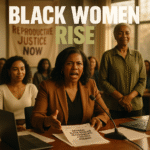
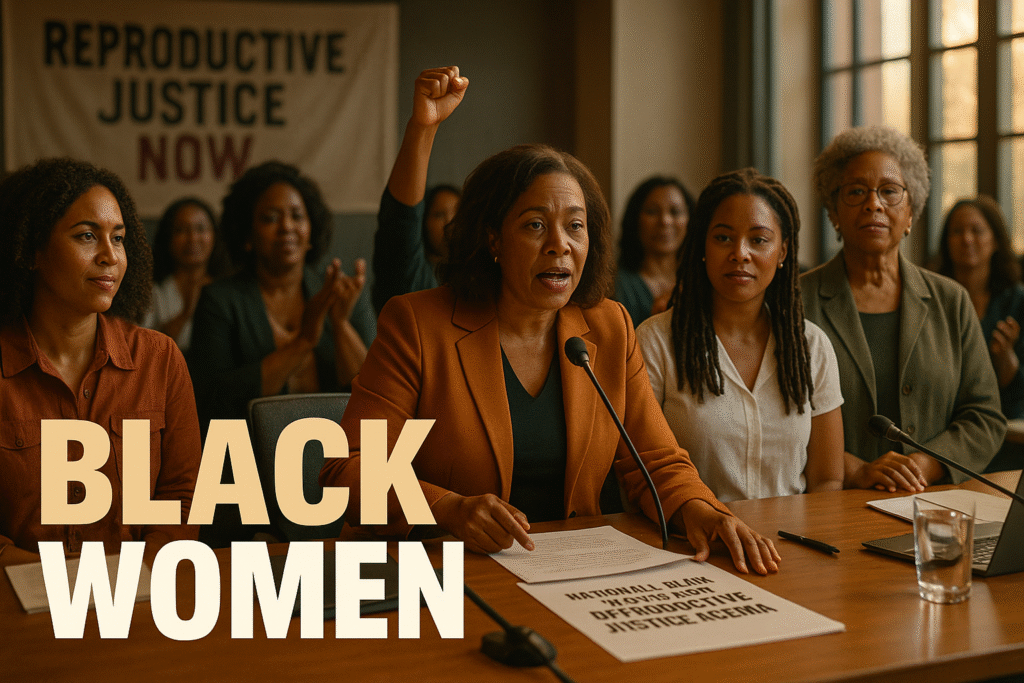
Black Women Launch Historic Reproductive Justice Agenda: A Fight Rooted in Centuries of Struggle
The History Behind The Headlines
By Darius Spearman (africanelements)
Support African Elements at patreon.com/africanelements and hear recent news in a single playlist. Additionally, you can gain early access to ad-free video content.
A Powerful Coalition Emerges From Crisis
In September 2025, more than 50 Black-led organizations joined forces to release the National Black Women’s Reproductive Justice Agenda. This comprehensive policy roadmap represents a critical response to mounting attacks on reproductive freedom. The collaboration between In Our Own Voice, Interfaith Voices for Reproductive Justice, and SisterLove produced over 100 pages of recommendations addressing health equity and social justice.
The timing of this agenda carries urgent significance. Black women face maternal mortality rates three to four times higher than white women. Moreover, nearly 7 million Black women of reproductive age live in states that have banned or severely restricted abortion access. The policy agenda addresses these intersecting crises through a human rights framework grounded in Black feminist theory.
Understanding Reproductive Justice Beyond Choice
True reproductive justice extends far beyond abortion access. It encompasses the right to have children, not have children, and parent in safe communities with economic security. The 2025 agenda includes groundbreaking sections on menopause care, recognizing that Black women enter menopause earlier and experience more severe symptoms.
This holistic approach reflects the framework created in 1994 by 12 Black women who coined the term “reproductive justice”. They recognized that middle-class white feminist movements focusing solely on “choice” failed to address systemic barriers facing Black communities. Therefore, these pioneering activists published a statement in the Washington Post with over 800 signatures, launching a movement that transformed reproductive rights advocacy.
Maternal mortality disparities show Black women face significantly higher pregnancy-related death rates than other racial groups
The Brutal Legacy of Forced Sterilization
The fight for reproductive autonomy emerged from a horrific history. Between 1907 and 1981, eugenic sterilization laws authorized the involuntary sterilization of thousands of Black women across America. In North Carolina alone, the Eugenics Board sterilized approximately 5,000 Black women between 1933 and 1973.
These sterilizations often occurred without consent or knowledge. Black women seeking routine medical procedures left hospitals unable to bear children. This practice became so common in the South that it earned the disturbing nickname “Mississippi appendectomy”. Fannie Lou Hamer, a civil rights activist, entered a Mississippi hospital in 1961 for a minor procedure and was sterilized without her knowledge or consent.
The eugenics movement targeted Black communities under the guise of improving public health. By 1965, 14 percent of Black women had undergone surgical sterilization. That number rose dramatically to 20 percent by 1971 as federal funding for family planning increased. Welfare recipients faced threats of losing benefits unless they consented to sterilization.
A timeline tracing the struggle for Black women’s reproductive autonomy from forced sterilization to today’s policy advocacy
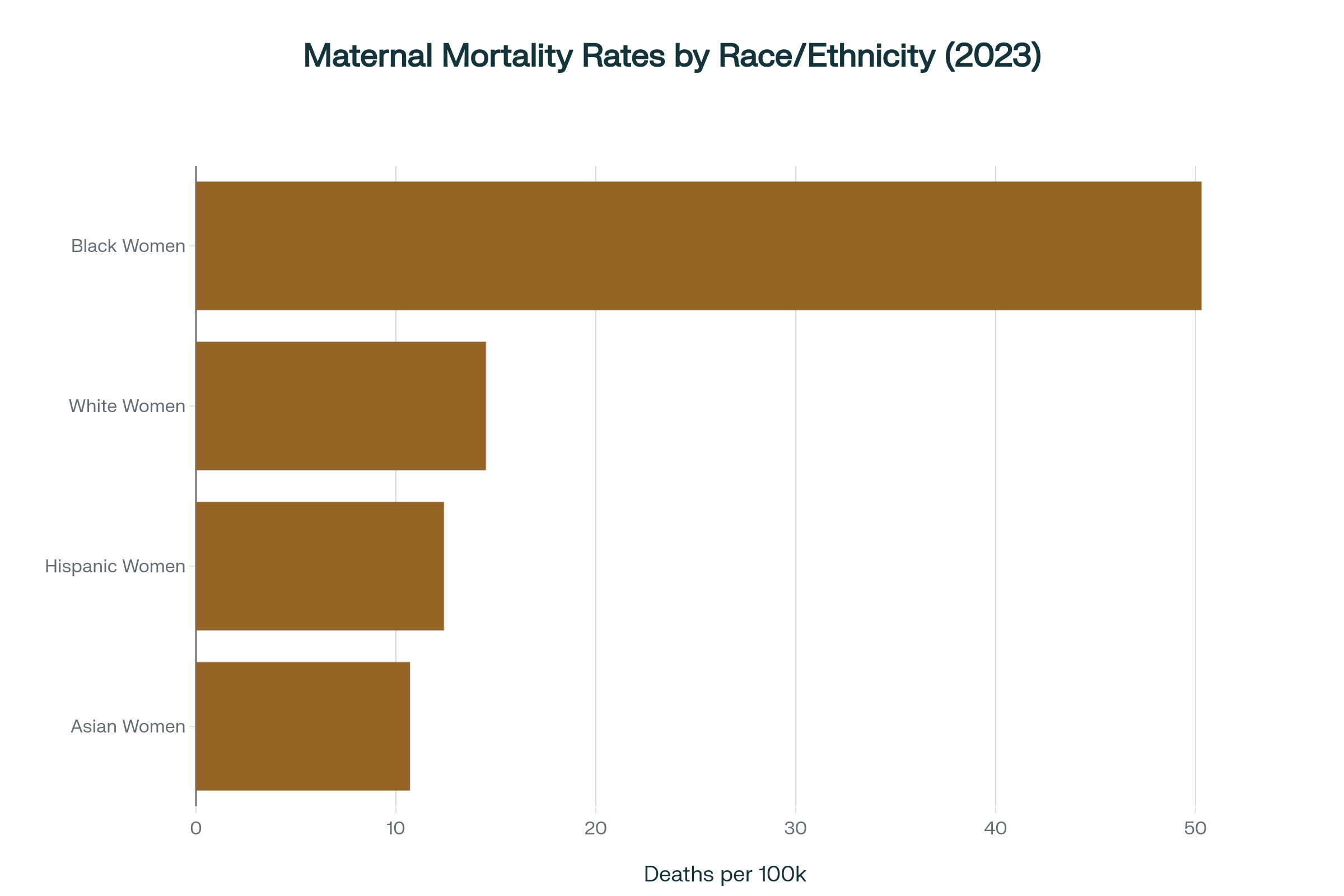
Economic Justice Connects to Reproductive Freedom
Reproductive restrictions carry devastating economic consequences for Black women. Research shows that eliminating barriers to abortion access would increase Black women’s annual earnings by 9.6 percent and boost labor force participation by 1.4 percent. These gains translate to more than $18 billion in additional annual earnings for Black women.
Black women currently earn just 69 cents for every dollar paid to white men. Over a 40-year career, this wage gap costs Black women working full time approximately $1,019,200 in cumulative income. Economic insecurity directly impacts reproductive choices and maternal health outcomes. Sixty percent of Black women who recently gave birth were economically insecure, compared to 31 percent of white women.
The absence of paid family leave disproportionately affects Black women, who often serve as primary breadwinners for their families. Additionally, access to affordable childcare remains limited in many Black communities. These economic barriers compound health disparities and limit reproductive autonomy.
Research shows eliminating abortion barriers would significantly boost Black women’s economic participation and earnings
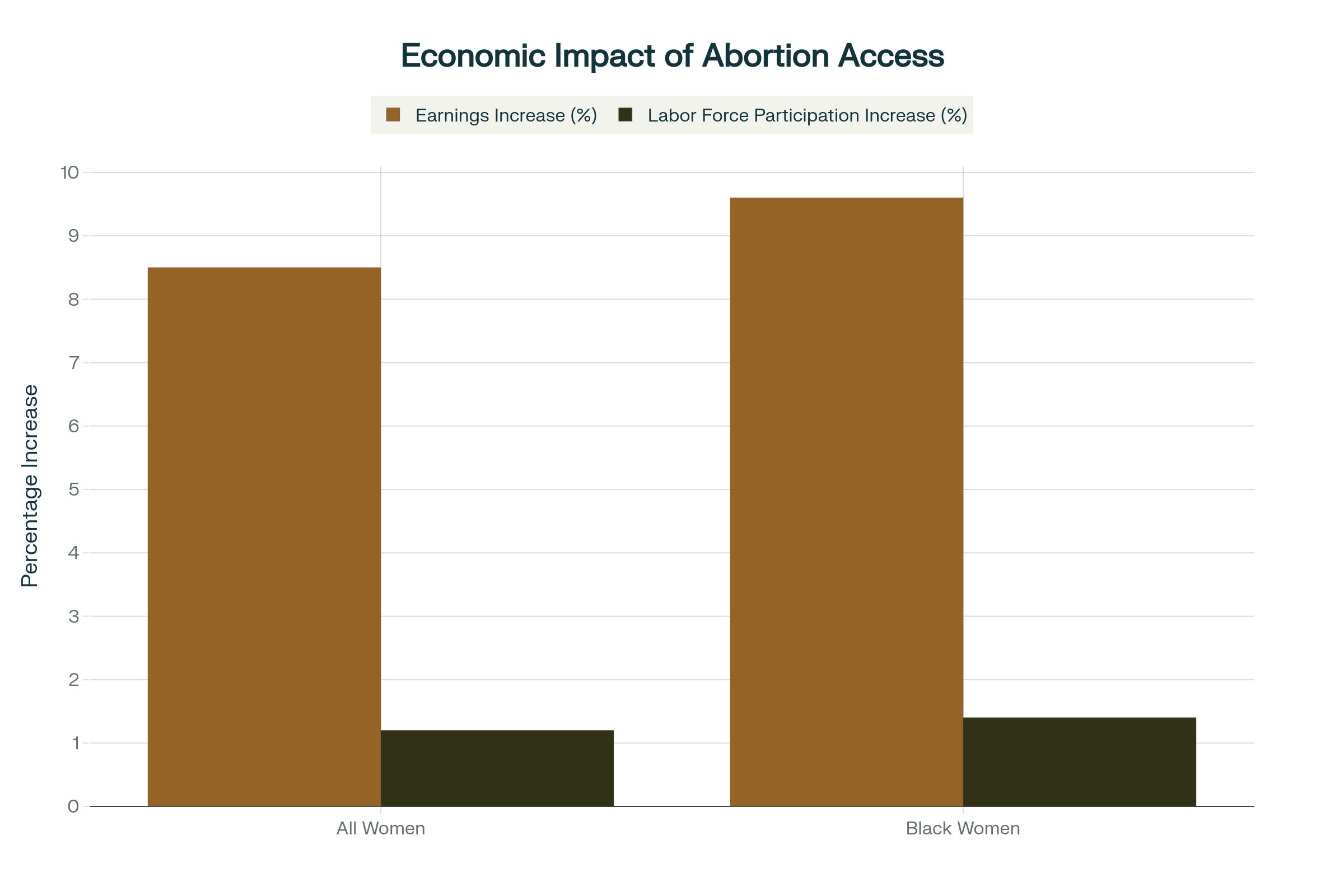
The Dobbs Decision Deepens Racial Health Disparities
The 2022 Supreme Court decision in Dobbs v. Jackson overturned nearly 50 years of federal abortion protections. This ruling has had catastrophic consequences for Black communities. More than half of all Black women of reproductive age live in states that have banned or severely restricted abortion access. These same states often have above-average maternal mortality rates.
Research estimates that total abortion bans could increase pregnancy-related deaths by 33 percent among Black women. The maternal mortality rate for Black women actually increased between 2022 and 2023, worsening existing racial disparities. Meanwhile, more than 80 percent of pregnancy-related deaths remain preventable.
Abortion restrictions also limit care for pregnancy loss, which Black women experience at higher rates. Almost all medications and procedures used to manage miscarriages are identical to those used in abortions. Consequently, clinicians hesitate to provide necessary care due to fear of prosecution.
Project 2025 Threatens Further Restrictions
The threat to reproductive justice extends beyond current abortion bans. Project 2025 proposes effectively banning abortion nationwide through multiple mechanisms. The agenda calls for enforcing the Comstock Act to prohibit mailing medication abortion and supplies.
Project 2025 would dramatically increase surveillance of pregnant people by mandating data collection for all abortions. This surveillance would disproportionately harm Black women, who already face over-policing and criminalization. States could lose funding if they refuse to participate in tracking people who get abortions.
The proposed policies would end access to medication abortions, which account for the majority of abortions in the United States. They would also bar hospitals from providing emergency abortion care. These restrictions would exacerbate existing inequities facing Black communities.
Systemic Racism Drives Maternal Health Crisis
The maternal health disparities facing Black women stem from deeply entrenched systemic racism. Black women experience maternal mortality rates of 50.3 deaths per 100,000 live births, compared to 14.5 for white women. These disparities persist across all education and income levels.
High-income Black women face the same risk of dying within the first year after childbirth as the poorest white women. This shocking reality demonstrates that education and economic resources alone cannot protect Black women from systemic racism in healthcare. Implicit bias, discrimination, and dismissal of Black women’s concerns contribute to these deadly outcomes.
Black infants also suffer from these health disparities. They face double the infant mortality rate compared to the national average. If the Black infant mortality gap were closed, an additional 2,885 babies could be saved in 2025. Nevertheless, the connections between maternal health and infant outcomes underscore the urgent need for comprehensive interventions.
Grassroots Organizing Drives Change
Black women have consistently led the fight for reproductive justice through grassroots organizing and community mobilization. The 2025 policy agenda builds on decades of activism by Black women who refused to accept reproductive oppression. From the Coalition to Fight Infant Mortality in 1980s Oakland to today’s national movement, Black women have centered their lived experiences in policy advocacy.
In Our Own Voice operates as a national-state partnership with eight Black women-led reproductive justice organizations. This structure ensures that policy recommendations reflect the needs of Black communities across diverse geographic and social contexts. The organization engages Black voters through research that documents their priorities and values.
A 2025 multi-state poll of 5,000 Black adults revealed that economic instability and limited healthcare access remain top concerns. Ninety percent of respondents reported that Medicaid has been important to them or their families. More than 80 percent said dismantling systemic racism is necessary for Black families to thrive.
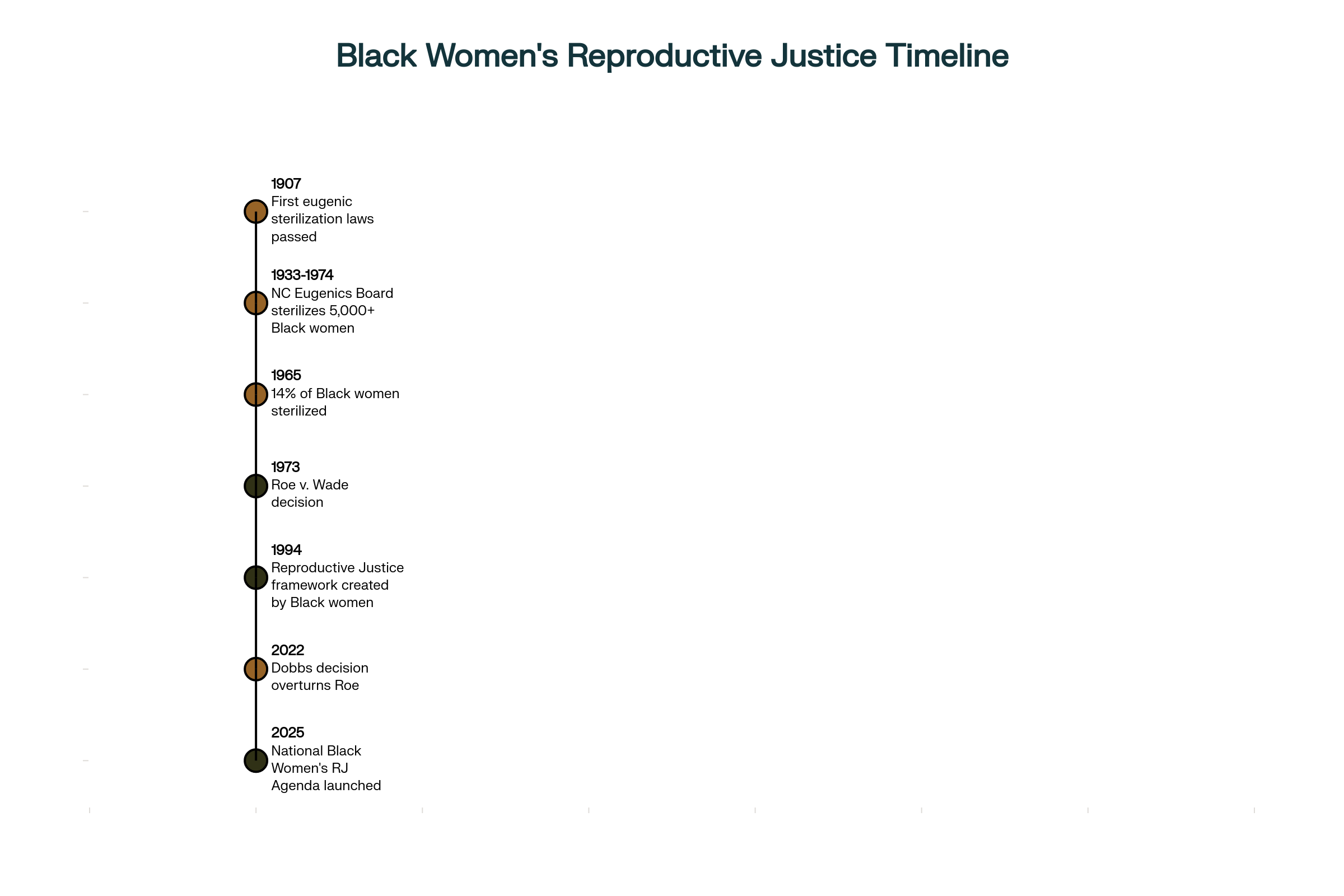
Policy Solutions Offer Path Forward
The National Black Women’s Reproductive Justice Agenda presents over 125 specific policy recommendations organized around three pillars: Healthy Body, Healthy Families and Communities, and Healthy Democracy. These recommendations address contraceptive equity, comprehensive sexual education, safe abortion access, and gender-affirming care.
The agenda advocates for the Right to Contraception Act, which would codify the legal right for individuals to obtain and use contraception. It also calls for comprehensive maternal health initiatives that address the specific challenges facing Black birthing people. In addition, economic security policies including paid family leave, affordable childcare, and fair wages form essential components of reproductive justice.
The policy agenda recognizes that reproductive justice cannot be achieved without addressing intersecting systems of oppression. Therefore, it includes recommendations on criminal justice reform, environmental justice, and voting rights. This comprehensive approach reflects the understanding that Black women’s ability to make reproductive decisions depends on economic security, political power, and freedom from violence.
Why This Matters Today
The National Black Women’s Reproductive Justice Agenda arrives at a critical moment when reproductive freedom faces unprecedented attacks. The policies outlined in this agenda provide a roadmap for federal, state, and local policymakers committed to advancing health equity. More than policy recommendations, however, this agenda represents the collective power of Black women demanding recognition and response to their needs.
The historical context illuminates why this work carries such urgency. From forced sterilization during the eugenics movement to current abortion bans, Black women have faced centuries of reproductive oppression. Yet they have also led powerful movements for change, creating frameworks that center human rights and bodily autonomy.
The stakes extend beyond individual reproductive decisions to the health and economic security of entire communities. Research demonstrates that abortion restrictions cost the United States economy $64 billion annually, with Black women bearing disproportionate harm. States with abortion bans also often fail to invest in policies supporting families, including Medicaid expansion and paid leave.
Black women voters represent the largest voting constituency in the American electorate. They consistently register voters, organize communities, and deliver decisive votes in elections. The reproductive justice agenda provides these voters and their allies with concrete policy goals to demand from elected officials. It also serves as an educational resource for understanding how reproductive freedom connects to economic justice, healthcare equity, and human rights.
The collaboration of more than 50 Black-led organizations demonstrates the breadth and depth of commitment to this work. From veteran reproductive rights organizations to newer grassroots groups, this coalition brings together diverse perspectives united by a common goal. Their collective wisdom, grounded in lived experience and rigorous analysis, offers solutions rooted in justice rather than compromise.
As attacks on reproductive freedom intensify, the National Black Women’s Reproductive Justice Agenda stands as both a defensive shield and an offensive weapon. It provides tools to resist further restrictions while simultaneously advancing an affirmative vision for reproductive autonomy. The agenda acknowledges painful history while refusing to be constrained by it. Instead, it charts a path toward a future where all Black women, girls, and gender-expansive people can exercise complete economic, social, and political power to make decisions about their bodies, families, and lives.es policymakers and voters to confront systemic harm and build a just future for Black communities.
ABOUT THE AUTHOR
Darius Spearman has been a professor of Black Studies at San Diego City College since 2007. He is the author of several books, including Between The Color Lines: A History of African Americans on the California Frontier Through 1890. Visit africanelements.org for more.
